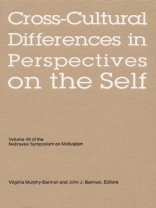Cross-Cultural Difference in Perspectives on the Self features the latest research in a dynamic area of inquiry and practice. Considered in these pages are cross-cultural differences in the idea of the person and in models of balancing obligations to the self, family, and community. Revisiting and questioning the concepts of self and self-worth, the authors investigate the extent to which factors traditionally associated with psychological effectiveness (intrinsic motivation; assuming personal responsibility for one’s actions; and feeling in control, unique, hopeful, and optimistic) are culturally bound. Hazel Markus and Shinobu Kitayama consider cultural differences in models of psychological agency; Joan Miller critiques the meaning of the term agency, analyzing the extent to which many popular theories in psychology rest on rather narrow Western models of behavior and effective functioning; Steven Heine calls into question the presumed universality of some forms of cognitive processing; Sheena Iyengar and Sanford De Voe apply a cross-cultural perspective to better understand intrinsic and extrinsic motivation and the value of choice; Kuo-shu Yang questions the universality of the pervasive and popular "theory of self-actualization" formulated by Abraham Maslow; and finally, Ype Poortinga reexamines not only the cultural boundaries of theory but also the very meaning of the concept of culture itself.
Nebraska Symposium
Nebraska Symposium on Motivation, 2002, Volume 49 [PDF ebook]
Cross-Cultural Differences in Perspectives on the Self
Nebraska Symposium on Motivation, 2002, Volume 49 [PDF ebook]
Cross-Cultural Differences in Perspectives on the Self
Compre este e-book e ganhe mais 1 GRÁTIS!
Língua Inglês ● Formato PDF ● ISBN 9780803203297 ● Editor John J. Berman & Virginia Murphy-Berman ● Editora UNP – Nebraska ● Publicado 2003 ● Carregável 3 vezes ● Moeda EUR ● ID 6940415 ● Proteção contra cópia Adobe DRM
Requer um leitor de ebook capaz de DRM












